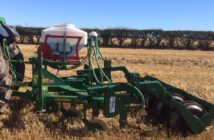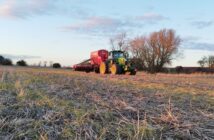The extremes of weather which have affected all parts of the UK this season have highlighted the need for farming businesses to operate a robust crop establishment system that is capable of delivering excellent results under all conditions, according to Suffolk arable farmer and agricultural engineer Jeff Claydon.
“This season has been extremely challenging for any establishment system and many farmers who relied on conventional or min-till methods were unable to drill the area of autumn- and spring-sown crops that they had planned,” states Jeff, who farms 325 hectares at Wickhambrook near Newmarket and is Chief Executive of Claydon Yield-o-Meter, which developed the patented Opti-Till® System.
“At the start of the year when I was travelling around the country to visit customers, I saw countless examples of soils in poor condition, probably from being over-worked or using inappropriate machinery at the wrong time. Some fields were waterlogged, slumped and capped, worm activity was minimal, those crops which had been drilled were stressed and even weeds refused to grow in some areas. Elsewhere, vital topsoil which had taken millions of years to form had washed off fields into ditches, streams and rivers, causing pollution and crop loss.
“The situation has been exacerbated because soils which could not be drilled in the autumn remained waterlogged over the winter, the wettest since national records began in 1910, but then dried out completely due to the lack of rain this spring. This resulted in less-than-ideal establishment conditions, poor germination and less effective weed control, which will ultimately reduce crop performance. The shortfall in plantings combined with below-average yields could mean that the UK will have to rely on imports to meet end-user requirements later in the year.
“This scenario has obviously struck a chord with farmers, because the enquiries that we have received in recent weeks indicate that many have decided to re-evaluate their approach and are looking to adopt a more efficient, resilient system for the future.”
A SYSTEM WITH SIGNIFICANT BENEFITS
Since inventing and pioneering the strip seeding concept in 2002, Jeff has spent 18 years perfecting the Claydon Opti-Till® System. A fast, efficient, flexible, holistic method of establishing any crop which can be air sown, it delivers consistently high yields more efficiently, at much lower cost, together with less agronomic and financial risk, but provides significant economic, ecological and environmental benefits.
“The very heavy Hanslope Series chalky boulder clay soil on the Claydon farm is one of the most difficult in the country to manage,” Jeff states. “When wet it can become impossibly sticky, unfriendly and slow to drain, when dry it sets as hard as concrete. In both cases it is impossible to work, so all field operations must be carried out within a very narrow window of opportunity when conditions are exactly right. In the 52 years that I have been involved in farming I have tried every crop establishment system, under all conditions; it was their shortcomings that led me to develop a better solution, Claydon Opti-Till®.
“This autumn we established all 280 hectares of winter wheat, beans and oilseed rape that were planned in just 70 hours using this system. After harvest we had plenty of time to carry out an effective stubble management programme with a 15m-wide Claydon Straw Harrow and 6m TerraStar. All our winter wheat was in the ground by 31 October and the autumn establishment programme was completed on 19 November when the last of the winter beans went in using our 6m Hybrid T6c drill. Despite the atrocious weather at the time they established well and even the headlands now look exceptional.
“Wider crop rotations, combined with a 50:50 split between wheat and break cropping, have helped to spread the workload. This gave us plenty of time and opportunities to control volunteers and weeds using the Straw Harrow to encourage multiple flushes, any remaining green material being killed off with a single application of glyphosate pre-drilling in November. This left the fields clean but with a shallow layer of surface tilth which provided ideal conditions over the winter and going into spring, so we were able to drill the remaining 46 hectares of spring crops directly into this perfect growing environment during the last week of March.
“Our customers throughout the UK and overseas have also reported that Opti-Till® works reliably, even in the far-from-perfect conditions we have all experienced this season. It greatly improves timeliness, reduces establishment costs by up to 80%, creates well-structured, supportive soils, encourages high worm populations, promotes biodiversity and ensures excellent drainage. This results in sustainable, high yields, greater resilience to extreme weather events, numerous environmental benefits and improved profitability.”
SUSTAINABILITY IS THE KEY
The key is the Claydon Hybrid drill’s patented, leading tine, which remains stable and works at an even depth, even in variable soil conditions. Adjustable from 0mm to up to 150mm for establishing deep-rooting crops like oilseed rape, it lifts and aerates the soil, creating fissures, alleviating localised compaction, improving drainage and providing space for strong rooting structures to develop. The leading tine is followed by a separate seeding tine which places seed within a band in soil which has just been lifted and loosened.
Drilling seed in bands provides an ideal environment for worms to thrive. This is essential because their action benefits soil health in so many ways. Most worm burrows and capillaries are left undisturbed, so worm numbers are safeguarded, which aids drainage and water movement through the soil profile throughout the growing season. Plant roots are also left largely undisturbed which adds to the soil biota and improves its structure, organic matter depletion is minimised due to nominal soil disturbance, while moisture and nitrogen are preserved.
The friable tilth created by the drill’s leading tine allows fast, strong rooting. Emergence is rapid and unhindered due to the excellent soil structure, while the soil can also absorb heavy rainfall without capping. Because the seed is sown in bands crops utilise more of the growing area, maximising moisture and nutrient take-up. The fact that seed is spread across the working area of the seeding share allows more air and light into the crop, which improves photosynthesis as the plant grows.
“With more extremes of weather, profit margins under severe pressure and labour in short supply it has never been more important to operate the right crop establishment system,” Jeff states. “This means one which can operate effectively in all conditions, minimises weather risk and provides sufficient capacity to exploit weather windows, allowing crops to be drilled at the right time and in the right conditions to produce high yields and generate sustainable financial returns.”




